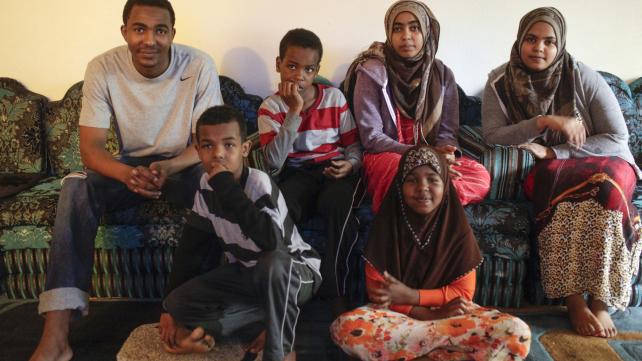
Gender relations in Islam are not based on male-female competition as is seen in a number Western societies today. Rather, this relationship is based on gender cooperation. (Quran: 4:32).
In the context of the family, God has made father the leader of the family while mother is in charge when father is not available. However, there are limitation God has put in place for this leadership position.
The power of this leader, like that of all other Islamic leaders, is limited on the one hand by the Quran and the Prophet's teachings, and on the other by Shura or mutual consultation - amruhum shura bainahum (Quran 42:38). Shura in this verse is mentioned by God as one of the essential characteristic of a believer along with prayers and justice.
The Muslim family, therefore, like all other Muslim institutions, formal or informal, must be run with mutual consultation.
One major cause of problems in the Muslim society today is the absence of Shura. The Shura process, if adopted as a personal behavior and nourished by the family as a way of life, will benefit the Ummah in the long run.
Some Guidelines for Informal Shura
Informal Shura is like talking to each other. It may happen at any place and at any time. Here are some examples of informal Shura and tips you can use:
- Listen attentively: no TV shows, games, books or newspaper should be in your way if your spouse or child wants to talk to you
- Shura doesn't have to be about family affairs: mutual consultation in the family could be about any topic. It was the advice of Umm Salamah, the wife of Prophet Muhammad, peace and blessings be upon him and may Allah be pleased with her, which the Prophet followed when Muslims were reluctant to obey him at the end of Hudaybiyah
- A serious topic could be introduce gradually if Shura is not the norm of the family
- Many women are afraid of bothering their husbands with "domestic" stuff. But take some time to think about how you'd like your husband to contribute.
- Spouses should brief each other about work, neighborhood, Masjid, and each other's activities. Mutual information is necessary for mutual consultation
- A family calendar will help tremendously for family time and Shura. In family meetings, go over next month's dates (teacher conferences, games, next family meetings etc.). A large month-by-month calendar in the kitchen, next to the phone may work well.
- A family leader must encourage Shura by being positive. If your wife or children are afraid of your reaction, they will not participate in Shura.
Shura in a restaurant: Spouses may meet each other everyday without ever actually discussing issues. Set a time to go out and talk.
Walking Shura: What about an evening walk to discuss a topic?
Formal Shura
Formal Shura is a process to reach an agreement on an issue of mutual interest. Everyone should participate in Shura with an open mind.
Some pointers on how to do this are:
- Begin the Shura with Allah's Hamd, Sana and Salawat on our Prophet
- you have to be willing to sacrifice your opinion if it is not accepted even if you are sure of its soundness
- Learn the details of the topic under consultation before you speak
- Listen attentively to what others are saying
- Be respectful in discussing each other's point of view
- Remember that the process of Shura involves abiding by what is agreed upon
- Involve all children in the formal Shura of the family. They come up with brilliant ideas
- Avoid being defensive or sarcastic. Be rational and reasonable
- Make Dua (supplication) for Barakah (blessings) in your decisions at the end
Consider a name change
My children suggest that "Family Meeting" or "Family Circle" is a better title for family Shura since "Shura" feels too serious.
They suggest that this forum should include discussion of any topic from the Quran, Sunnah or current affairs.
Nonverbal communication
Shura is about communicating effectively, both verbally and non-verbally. Here are some basic pointers on nonverbal communication:
- Frank and clear conversation with Taqwa (God consciousness) is the key for success (Quran 33:70)
- Nonverbal criticism (gestures, silent treatment etc.) can cause more problems then we normally realize
- Clearly communicate what you mean. Don't expect your spouse or others to magically read your mind, then be disappointed when they don't
- Nonverbal communication, however, works well in a show of love, thanks, or appreciation. Nevertheless, verbalizing it when you really mean it is better
Criticism is a type of Shura as well
Shura does not just entail basic discussion and positive comments. It can also include criticism.
However, it should be remembered that there are some etiquettes of giving input and feedback in Islam. Some of these are:
- Check your motives (Niyyah) first before opening your mouth. You should be giving constructive criticism only to help someone, not to make yourself feel better than others
- Make Dua for yourself and the person you are approaching before you actually do it
- Think beforehand and choose appropriate words
- Don't sound critical, condescending, or judgmental
- Timing is important: don't do it when the fight is on
- Criticism is best received when done one on one
- Remember the Prophet said "A Mumin (believer) is a mirror to another Mumin." So just state what you see. Don't exaggerate.
- Keep in mind that your information or even your conclusions may be wrong
- Listen to the explanation attentively and accept it even if it is partially correct in your view
- Avoid debating the point
- Know when to stop. Don't drag out the discussion if it's not going anywhere
Just as it's important to know how to give criticism, it's crucial to know how to receive it. Here are some etiquette suggestions:
- Thank the person who considers your improvement important enough to help you with his/her thoughts.
- Welcome the feedback. Ask advice about how it could be improved
- Explain if there is any misunderstanding
- Admit mistakes
- Bad timing should not deter you from listening and benefiting
- The person criticizing should not be stopped because of location, language, or manners.
- Do not turn the table and start criticizing that person in the same sitting.
- Make Dua for the person who is criticizing you.
Involving children in Shura
Children are intelligent, thinking beings who have much to contribute to discussions. Too often, parents dismiss the opinions and thoughts of their kids, thinking their youth and inexperience mean they are too young for Shura. Not so.
Doing Shura in the family helps kids learn how to communicate effectively in a safe, comfortable environment. Parents need to remember that their love is crucial in raising their children, but it's not enough to raise a well-adjusted, happy child. Communication is the key for successful development.
Here are some tips to help you encourage your kids to communicate effectively and participate in Shura in the family:
- When they are very young, get them into the habit of talking with you about their day and their feelings
- Shura is among the choice characteristics of a Mumin. (Quran 42:38) Inculcate it early on. (My youngest child sits down during family Shura with a pen and paper and takes notes, although he doesn't't know how to write)
- Children should be full participants of any formal or informal Shura in the family unless the issue at hand has to be between the father and mother exclusively
- Children open up informally more than formally. Two minute sound bites from them in a car may provide more important insight into what they feel than forced conversation
- Children love to ask questions. Answer their questions with one of yours: "what do you think?" Think of their questions as the start of a two-way conversation (mutual Shura may pop in any time).
- Let children come up with solutions. Instead of giving advice, ask "so what would you like to do about this?" or "How do you think this should be handled?"
- Delegate an area of responsibility to your child instead of adopting a " do this, do that" style of communication with them.
- Avoid electronic overload: TV, stereos, computers etc. are a convenient way for kids to close off from their parents. Set rules for TV (check out these 21 tips by the author that can help you do this)
- Keep your sense of humor. Laughing won't undermine your authority or sabotage the lessons. Rather, it will enhance your capacity to communicate
- Respect children's opinion
- Carefully listen to what your kids say without being judgmental or critical
- Reward a good idea
More resources on related topics
There are several articles and essays on Sound Vision's website about parenting, the husband and wife relationship, and education. A detailed version of this paper will also be put there, insha Allah, in future.
Sound Vision has a set of three video documentaries about the Muslim Family on sale. The set includes: the Ideal Muslim Husband (the Prophet) and Hijab. Read about the proper listening in the shura.
Related themes to study from the Quran and Sunnah are: Maroof, Munkar, Sabr, Tawakkul, Anger, Brotherhood, Gheebah, Zann, Tongue.
Related Quranic verses to study: 49:9-13; 41:34; 49:6; 20:43-44; 2:44; 61:2-3; 5:2; 3:110; 9:71; 9:67; 16:125; 31:17-19; 7:199.
Insha Allah (if Allah wills), I plan to write more on this topic, so please give me your input, criticism and advice.
Photo credit: Stephanie Yao Long (OregonLive.com)








Comments
Beautiful, comprehensive
Beautiful, comprehensive advice.
Location
Thanks for the info convey.
Thanks for the info convey. Our duty as priviledge reader is to do the duplicate or photocopy it to be distributed to Muslims during Jumat or muslim gathering. It can as well give non muslims to see the beautiful teachings in Islam.
May Almighty Allah (swt) grant us means to convey the message further.
Location
A great reminder for all of us - those who are struggling to bring up their children the right way in an environment controlled by the kuffar as well as those who live in muslim countries and take Islam for granted.
Location
We practice this since twogenerations and it is good for all
Location
This is really insightful! Helped me a great deal in my research paper. Thanks so much for the information and may you be blessed with greater knowledge and wisdom!
Location
Oh! Alhamdulillah and may His peace and blessing be on the Noblest of Prophet i.e. Muhammad(S.A.W.). I am too happy for discovering this site of yours, May Allah forgive and Admit all of you involved directly or indirectly in this JIHAD in to Aljannatul Firdaus, Ameen!
Location
Alhamdollilah very good. Please stress the importance by saying that it is also HUKAM(Order) from Allah, Even Rasool Allah (SAW) was ordered to make Shura.
Location
This was a great format on what can be done in a family to keep them close and together. To keep each person a key member is a thing that keeps everyone in line, and not straying. Keep your children involved and listen they will pass what is taught to them.
Location
Alhamdulillahi, when I know about siundvision I was at Anambra State doing my NYSC PROGRAMME. Therefore , the issue of Shuroo is what every muslims must take as serious because most of the broken homes nowadays emerge as a result of no shuroo. Please send all the necessary information to me . Jazakumlahu Khaeran
Location
JazakAllah Khair for your wonderful articles - they are so useful and informative. Such good ideas.
Location
Pages
Add new comment